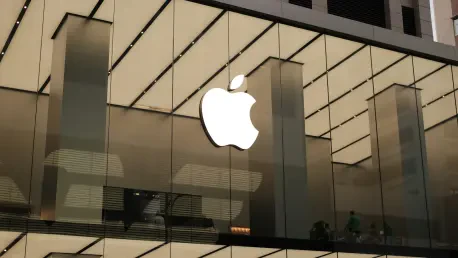What happens when a tech titan, revered for innovation, is accused of squeezing millions from unsuspecting users? Picture millions of iPhone and iPad owners in the UK, tapping away at apps, unaware that each purchase might be padded with hidden costs. A staggering $2 billion fine, levied by the UK’s Competition Appeal Tribunal (CAT), has thrust Apple into the spotlight, challenging the very foundation of its App Store empire. This isn’t just a legal skirmish; it’s a seismic shift that could alter how digital marketplaces operate for everyone.
Why This Ruling Rocks the Tech World
This landmark decision isn’t merely about a hefty fine; it represents a critical turning point in the battle against Big Tech’s dominance. The CAT has ruled that Apple abused its market power by imposing excessive commissions on app developers, costs that ultimately trickled down to consumers. With damages estimated at 1.5 billion pounds (approximately $2 billion), this case underscores a growing global frustration with unchecked corporate control over digital ecosystems.
Beyond the numbers, the significance lies in its potential to reshape consumer rights. Representing millions of UK users, this lawsuit marks a triumph for collective action, proving that even giants like Apple can be held accountable. It’s a wake-up call, signaling that the era of unquestioned tech supremacy might be nearing an end.
The Heart of the Accusation
At the core of this legal storm is Apple’s App Store, a platform that dictates how apps reach iOS users. The tribunal found that Apple’s commissions, often as high as 30% on transactions from 2025 onward, far exceeded a fair rate of 17.5%. Half of this overcharge, according to the CAT, was passed on to consumers, inflating the cost of every app purchase or in-app transaction for millions.
The case, spearheaded by British academic Rachael Kent, argues that Apple’s “100% monopoly” over app distribution on its devices left developers with no choice but to comply with these terms. This lack of competition, the tribunal noted, created an environment where exploitation thrived, stifling innovation and burdening users with unfair prices.
The financial impact is staggering, but the deeper issue is systemic. Critics point out that such practices not only harm consumers but also hinder smaller developers who struggle under the weight of these fees, often unable to compete in a market rigged against them.
Inside the Courtroom Battle
The courtroom drama unfolded with sharp contrasts between the plaintiff’s accusations and Apple’s defense. Rachael Kent, the driving force behind the lawsuit, delivered a powerful statement: “This verdict proves that no corporation, regardless of its wealth or influence, stands above the law.” Her words resonate with a growing chorus of voices demanding fairness in the tech industry.
Apple, however, remains defiant. The company insists that the App Store fosters a secure and competitive space for both developers and users, arguing that the tribunal’s findings misrepresent the dynamics of the app economy. Despite this stance, the CAT’s ruling aligns with broader regulatory critiques, including ongoing antitrust investigations in Europe, painting a picture of systemic issues within Apple’s business model.
This clash of perspectives highlights a fundamental tension. On one side, there’s a narrative of innovation and safety championed by Apple; on the other, a verdict that labels the same practices as exploitative, raising questions about who truly benefits from the current app ecosystem.
A Global Ripple Effect
The UK ruling doesn’t exist in isolation—it’s part of a worldwide wave of scrutiny on tech giants. Similar concerns about app store policies echo in the U.S. and Europe, where Apple faces parallel challenges over its commission structures. This decision could embolden other lawsuits, including a notable case against Google over Play Store fees set for trial in 2026, potentially creating a domino effect across jurisdictions.
Moreover, the case strengthens the UK’s class action framework, now a decade strong, which has historically struggled to deliver wins for consumers against tech behemoths. This victory sets a precedent, paving the way for future challenges against companies like Amazon and Microsoft, and signaling that collective legal action can be a potent tool for accountability.
The implications extend to market behavior as well. If upheld, this fine might pressure Apple and others to rethink their fee structures, possibly leading to lower costs for apps and services, a change that could benefit consumers globally while fostering a more competitive digital landscape.
Charting the Path Forward
As this historic ruling reverberates, stakeholders at every level—consumers, developers, and policymakers—must consider their next moves. For users, staying informed about similar cases and their outcomes is crucial, as these decisions could directly impact app pricing and availability. Awareness can drive demand for transparency in how tech platforms operate.
Developers, often caught between platform rules and profitability, have an opportunity to push for change. Advocating for alternative distribution channels or joining forces in collective actions could challenge restrictive policies, encouraging fairer commission rates that support smaller players in the industry.
Policymakers, meanwhile, hold the power to build on this momentum. Strengthening antitrust laws and class action mechanisms in the UK and beyond can ensure that tech giants face consistent oversight. By crafting regulations that balance innovation with equity, governments can help create a digital economy where competition thrives, benefiting all rather than just a few.
Looking back, the CAT’s decision against Apple stood as a defining moment in the struggle for fairness in tech. It exposed the hidden costs borne by millions and fortified the resolve of those challenging monopolistic practices. As Apple’s appeal loomed and other battles emerged on the horizon, the path ahead demanded vigilance, collaboration, and a commitment to reshaping digital markets into spaces of genuine opportunity and equity.









